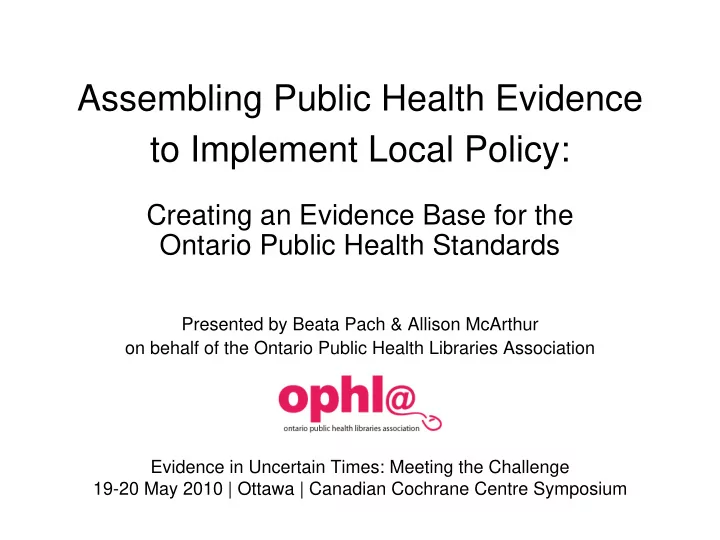

Assembling Public Health Evidence to Implement Local Policy: Creating an Evidence Base for the Ontario Public Health Standards Presented by Beata Pach & Allison McArthur on behalf of the Ontario Public Health Libraries Association Evidence in Uncertain Times: Meeting the Challenge 19-20 May 2010 | Ottawa | Canadian Cochrane Centre Symposium
Ontario Public Health Standards
Evidence-informed Public Health Practice & Decision Making
Evidence-informed Public Health The process of finding, appraising, distilling and disseminating the best available evidence, whether from research or actual practice, and using that evidence to inform and improve public health policy and practice. Source: Ciliska & Shum, 2010
Public Health vs. Medicine • Focus on individuals • Focus on populations • Diagnosis & treatment • Prevention & health promotion • Environment & human • Clinical interventions behavior interventions • Diverse workforce, variable • Well-established profession, standardized education & certifications education & certification • Clinical sciences integral; • Social sciences integral; social sciences less clinical sciences peripheral emphasized to education Adapted from: Medical Library Association, 2004
Research in Public Health and Clinical Medicine Evidence-based Evidence-informed Research Characteristics Medicine Public Health Experimental studies with control Study Designs Observational studies groups (RCTs) Volume of More Less Evidence Time from Intervention to Shorter Longer Outcome Adapted from: New Hampshire Institute for Health Policy and Practice, 2006
Evidence Pyramid Source: DiCenso, Bayley, & Haynes, 2009
Evidence Pyramid in Public Health Practice Source: Robeson et al, 2010
Complicating Factors in EIPH • Systematic reviews –Scarcity –Quality • Abundance of “grey” literature –Unpublished practice-based research • Context is crucial
Public Health Decision Making in Context Source: National Collaborating Centre for Methods and Tools, 2008
Policy Implementation Decision Process (“Top Down” Approach) Source: OPHLA, 2010
Developing a Custom Evidence Tool
Planning Phase • Objectives – Inform program implementation – Provide the most up-to-date evidence – Promote use of quality research tools – Cost effective – Minimize barriers to access (registration/login requirements) – Integration with existing information tools – Accessible to public health community outside of Ontario • PubMed best match for our needs
Development Phase • Integration with program standards – Analysis of Ontario Public Health Standards – Approximately 1 search per requirement – 138 search strategies in total • Scope & breadth of searches – Variety of setting, populations, interventions • Addressing user behaviour – Getting the best results on p. 1 – Minimizing false hits
Release of the Searches • Go-live date: December 2008 • Supports – Instructional guide • PubMed tips • Customization for advanced users • Full text retrieval options – Critical appraisal guide • Raising awareness / promotion – Part of OPHS communications plan – OPHS & OPHLA websites – Training at health unit level – Conference presentations: OPHA
Next Steps
Next Steps • Database of PH programs and interventions from health units • Initiate an evaluation of our searches • Expansion of searches on additional topics
Questions?
Recommend
More recommend